Peter MALONE
Saturday, 18 September 2021 19:25
Red Heat
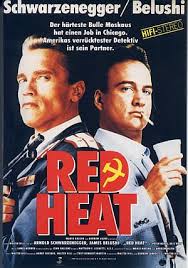
RED HEAT
US, 1988, 106 minutes, Colour,.
Arnold Schwarzenegger, James Belushi, Peter Boyle, Larry Fishburne, Gina Gershon.
Directed by Walter Hill.
Red Heat is a star vehicle for Arnold Schwarzenegger. He plays a Russian policeman, has opportunity to show off his brawn as well as indicate some kind of relentless brainwork as a Russian official. It is also a star vehicle for comedian Jim Belushi who acts in his usual zany way. They make an unusual police team.
The film was written and directed by Walter Hill, best known for such tough entertainments as Southern Comfort, 48 Hours, Extreme Prejudice. This film is particularly tough and violent. It has Chicago settings, confrontations, shoot-outs, chases - especially a culmination with two buses confronting each other.
The film belongs to the popular genre of the '80s with the police buddies and the police chase. It also reflects the drug culture of the '80s - not only in the US but in the USSR. The film also reflects the glasnost of the late '80s with some of the filming done in Moscow and Budapest.
Exactly what is expected from Schwarzenegger and Walter Hill.
1. Police thriller? Action thriller? Drugs? Russians and Americans together?
2. Russian locations, Chicago locations? Authentic? Light and darkness? The shadow world of the drug couriers? Special effects, stunt work? Musical score?
3. The title - and its reference to American-Soviet? relationships?
4. The focus on Danko: the opening in Russia, the strong men and women, the baths, the fight? Danko and his work? The mission from the Russian authorities? Viktor and his drug-running in Russia, the confrontation in the club, the deaths? Danko's arrival in Chicago, the encounter with Art - and the contrast between the two? His not revealing his mission, the extradition? The encounter with the police chief? The other officials? Settling into the hotel? The confrontation with Viktor, the violence? The key? The Chicago police finding out the truth? Working with him? The contacts, Viktor's wife? The set-up? The confrontation, Viktor and his killings? The hotel murders? The pursuit, the car, the buses? Viktor's death? His friendliness with Art, getting to understand him, explanations about his background? Mission achieved?
5. The contrast with Art, the wisecracking Chicago police, the initial mission, dangers, violence? Drugs? Helping with Danko? The dangers, the confrontations? With his superiors? The interrogation of the informer and the breaking of his hand? Accompanying Danko, trying to understand him, the dangers? Viktor's wife, her death? The friendship?
6. Viktor, Russian drug criminals, record? The United States, drug deals? Brutality? The American wife? The murders, the confrontations? The final violence and his death? The film's comment on Russian criminals?
7. The picture of the police: the chief, his co-operation, exasperation? The chief's assistant and his files, information, interrogations?
8. The world of the criminals: Viktor and his connections, the black drug dealers, the shoot-outs? The girl and her marriage, her death?
9. The picture of crime in the streets of Chicago? The role of law enforcement agencies? Collaboration between east and west?
Published in Movie Reviews
Published in
Movie Reviews
Tagged under
Saturday, 18 September 2021 19:25
Rebel
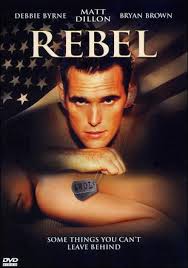
REBEL
Australia, 1985, 91 minutes, Colour.
Matt Dillon, Debbie Byrne, Bryan Brown, Bill Hunter, Ray Barrett, Julie Nihill. Kim Deacon.
Directed by Michael Jenkins.
Rebel is based on the play No Names... No Pack- Drill by Bob Herbert and was adapted for the screen with director Michael Jenkins. It is an unusual mixture of a World War II story, Sydney 1942, with a more contemporary musical style. The range of songs, many of them very attractive and entertaining, are by Peter Best (The Picture Show Man) and the musical score by Chris Neal.
Whether the film works as a coherent whole is open to question. However, it is an experiment in making a stylised war movie decades after the event.
Debbie Byrne gives a strong performance as well as lively renditions of the songs. Bryan Brown is at home with the role of a black marketeer in Sydney during the war. However, the American lead is Matt Dillon - giving a tortured performance but not necessarily credibly integrated into the whole film. Character actors like Bill Hunter and Ray Barrett lead a strong supporting cast.
In the '80s, several films were made about the effect of Americans in Australia during World War II: Emma's War starring Lee Remick and Death of a Soldier, based on the Leonski killings, starring James Coburn and Reb Brown.
1. Interesting and entertaining war story? Human story of relationships? A glimpse of the past? Musical interpretation?
2. The style and structure of the film: drama and musical? Showy and stylised, contrived? The Panavision photography? The sound engineering for the songs, the cabaret? The atmosphere of World War II and the stylised flashbacks? Sydney 1942, the club, the wharves? The stage sets? Colour and the pervading red? Decor, costumes? The choreography and style?
3. The title of the film and its focus, the original play - the film? The man from the south, the southern gentleman, absent without leave, the deserter? His experience of war?
4. The prologue and its stylised presentation, the pervading red, the war, the bamboo, the explosions, the Japanese and the Americans? Violence - desperation? The inserts of the war footage throughout the film? Rebel's story, audience reaction to it? And his showing the photo?
5. The songs and their range, the welcome to the Americans, air raid? The more plaintive songs and the ballads? `Don't Sweetheart Me'? `Mourning Steve'? `Nothing So Lethal as Love'? `Hero'? `The Boy from Alabama Meets the Girl from Gundagai'? The American war music? Debbie Byrne and her rendition, the musical accompaniment, the chorus, the mood and the choreography? The insertion of the songs into the plot?
6. The club, decor for the war, gaudy, the lights, the stage, the crowds? The American soldiers? The drinking? Bubbles and his style? Costume, playing? Singing with Kath? Steve? The characters at the club, performance? The reaction to the situation, tragedy?
7. American and Australian relationships in 1942? The outbreak of the war, the loud Yanks in Sydney, rest and recreation? Brothels, the black market, the spivs? The reaction of Australian women to the presence of the American soldiers? In retrospect?
8. Debbie Byrne's performance as Kath: the background of her life, the marriage? Singing and her talent? Steve and her brother, at war, deaths and sadness? Her ability, Bubbles using her? Her relationship with the girls in the chorus? The birthday party? The meeting with Rebel, the attraction, caution, hiding him? The friendship, the growing relationship? The return, their experiences together? Tiger and his double deals to get Rebel away? The police search? Joycie and her reaction, the truth? The search for Rebel? Helping him escape? Prison, return? Her relationship with him, her love for her husband - and the news of death?
9. Matt Dillon as Rebel, in the war, the experience of war, shell-shocked? Landing in Sydney, relying on the club? Its effect, happiness? His trauma? The party, the effect, his needs, haunted? Going round the town? The encounters with Tiger, the money for the boat, the failure of the escape? The pursuit of the military police? The friendship with Kathy and the bonds, the sexual encounter? The telegram? The hiding, Tiger and his collaboration? The bath, betrayal? Giving his word, the escape? The fight, wrestling? Tiger and the final confrontation? His return, giving himself up? The Christ symbolism - walking on the water to Chile? Tiger as the Judas? The confrontation, the knockout?
10. The portrait of the girls, Joycie, their performance, the relationships with the Americans, the good times? The work and the band? The police?
11. Tiger, the spiv, the black market and his industry, deals, the car, henchmen? Boats and tickets? Santa Claus? The house, his pretence, the betrayal, helping Rebel? The knockout?
12. The MPs and their work during the war, Australians, deserters? The investigations? Interrogations, the bashings, black and white soldiers? Arrests?
13. A partial look at Sydney during World War II, the experience of war, rest and recreation, memories?
Published in Movie Reviews
Published in
Movie Reviews
Tagged under
Saturday, 18 September 2021 19:25
Real McCoy, The
THE REAL McCOY
US, 1996, 106 minutes, Colour.
Kim Basinger, Val Kilmer, Terence Stamp.
Directed by Russell Mulcahy.
The Real McCoy? is an entertaining bank robbery caper. It is a star vehicle for Kim Basinger, who is attractive in the central role. Val Kilmer is good in support. The villain is Terence Stamp.
The film has Georgia and Atlanta settings, takes advantage of technology. However, the plot and the characters are very familiar from the genre. Direction is by Russell Mulcahy, the Australian director of Razorback. For Hollywood he made the Highlander films as well as Blue Ice, Ricochet, The Shadow.
1. Entertaining heist, caper story? With '90s technology?
2. The Georgia backgrounds, the city of Atlanta, homes, the woods, the bank? Musical score?
3. The title and the slang phrase? Karen as the genuine article?
4. The impact of the opening, the robbery, the skill, techniques, strength? The security system? Being caught? To prison, the six years passing? Getting out - and audience expectations that it would be a man? Initial response to Karen?
5. Karen and her story, her marriage to Roy, the tomboy background? Love for her son? Roy telling Patrick his mother was dead? Her hopes in phoning Roy, wanting contact with Patrick?
6. The parole officer, his chauvinist treatment, pressure on her? The range of job interviews and the refusals? Finally getting work, the parole officer and getting her fired?
7. In the supermarket, watching J.T. and his bungled robbery? Meeting him at the parole board? His admiration for her? Offering her housing? His link with Jack, his visit to get help for Karen and a job? The irony of their dinner together and his touting for Jack?
8. Karen seeing Patrick, watching him in the park? The kidnapping, her being blackmailed by Jack? The rescue and the chase in the car, the forest? The parole officer and his brutality? Jack and his control?
9. Her agreeing to do the robbery, the building up of the team, the plan? Her disguise as Miss Baxter, the visits to the bank, charming the officer? Studying the plans? Her decision against Jack, the plan with J.T. and his planting the gun? The preparations?
10. Jack and his wealth, sinister? His mansion? His gang and their brutality? The parole officer in his pay? The symbolism of his having tigers in his park?
11. The heist detail, the security, the police coming four times? The different squads and their work? J.T. and the loss of power? The skill and timing? Locking Jack and the group in the vault? Her taking Jack's money from his safe?
12. The final confrontation with the parole officer, the rescuing of Patrick? The tigers? Going to the airport, the disguises? Roy and his having the gun, wanting the money, J.T. rescuing Karen? In the plane, the irony of the police and the organ transplant?
13. The nicely amoral ending, audience sympathies? Old-fashioned styled robbery filmed with comic touches?
US, 1996, 106 minutes, Colour.
Kim Basinger, Val Kilmer, Terence Stamp.
Directed by Russell Mulcahy.
The Real McCoy? is an entertaining bank robbery caper. It is a star vehicle for Kim Basinger, who is attractive in the central role. Val Kilmer is good in support. The villain is Terence Stamp.
The film has Georgia and Atlanta settings, takes advantage of technology. However, the plot and the characters are very familiar from the genre. Direction is by Russell Mulcahy, the Australian director of Razorback. For Hollywood he made the Highlander films as well as Blue Ice, Ricochet, The Shadow.
1. Entertaining heist, caper story? With '90s technology?
2. The Georgia backgrounds, the city of Atlanta, homes, the woods, the bank? Musical score?
3. The title and the slang phrase? Karen as the genuine article?
4. The impact of the opening, the robbery, the skill, techniques, strength? The security system? Being caught? To prison, the six years passing? Getting out - and audience expectations that it would be a man? Initial response to Karen?
5. Karen and her story, her marriage to Roy, the tomboy background? Love for her son? Roy telling Patrick his mother was dead? Her hopes in phoning Roy, wanting contact with Patrick?
6. The parole officer, his chauvinist treatment, pressure on her? The range of job interviews and the refusals? Finally getting work, the parole officer and getting her fired?
7. In the supermarket, watching J.T. and his bungled robbery? Meeting him at the parole board? His admiration for her? Offering her housing? His link with Jack, his visit to get help for Karen and a job? The irony of their dinner together and his touting for Jack?
8. Karen seeing Patrick, watching him in the park? The kidnapping, her being blackmailed by Jack? The rescue and the chase in the car, the forest? The parole officer and his brutality? Jack and his control?
9. Her agreeing to do the robbery, the building up of the team, the plan? Her disguise as Miss Baxter, the visits to the bank, charming the officer? Studying the plans? Her decision against Jack, the plan with J.T. and his planting the gun? The preparations?
10. Jack and his wealth, sinister? His mansion? His gang and their brutality? The parole officer in his pay? The symbolism of his having tigers in his park?
11. The heist detail, the security, the police coming four times? The different squads and their work? J.T. and the loss of power? The skill and timing? Locking Jack and the group in the vault? Her taking Jack's money from his safe?
12. The final confrontation with the parole officer, the rescuing of Patrick? The tigers? Going to the airport, the disguises? Roy and his having the gun, wanting the money, J.T. rescuing Karen? In the plane, the irony of the police and the organ transplant?
13. The nicely amoral ending, audience sympathies? Old-fashioned styled robbery filmed with comic touches?
Published in Movie Reviews
Published in
Movie Reviews
Tagged under
Saturday, 18 September 2021 19:25
Rashomon
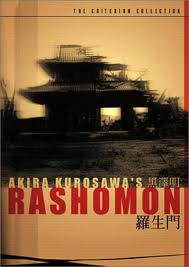
RASHOMON
Japan, 1951, 83 minutes, Black and White.
Toshiro Mifune, Machiko Kyo, Masayuki Mori, Takashi Shimura.
Directed by Akira Kurosawa.
Rashomon has been hailed as one of the Japanese cinema's classics. It is a masterwork of Akira Kurosawa who pioneered the film industry in post-war Japan (while making features during the war). Most of his films had Samurai settings including this film. His Samurai classic is The Seven Samurai. Others include Sanjuro, Yojimbo. Kurosawa also adapted Shakespeare with Throne of Blood (Macbeth) and Ran (King Lear). He won the Oscar with Dersu Uzala in 1975.
Many of Kurosawa's films were remade in the US. This film became The Outrage (1964) with Paul Newman, Laurence Harvey and Claire Bloom. And its many faceted storytelling and angles on truth has been often imitated. The Seven Samurai became The Magnificent Seven and Yojimbo was the inspiration for Sergio Leone's Fistful of Dollars films.
1. This film is considered a cinema classic. Why? What were its outstanding features? As an example of Japanese cinema? The photography, the style of discovery of truth, the performances? Its value as a fable for insight into human attitudes towards truth?
2. How important was the Samurai background and atmosphere for the film? As a legend? In legendary times and myths? Its importance for the modern generation therefore to understand the truth?
3. Comment on the formalism of the film? The rain background and its final stopping? The discussion at the temple? The presentation of the stories and their counterpoint? The formality of Japanese politeness and form?
4. The significance of the priest, the woodcutter, the observer and their discussion? Does truth emerge from the sharing of stories? The quality of their talk and its dramatic impact in this film? How was the priest a focus for the audience of the values of the film? A symbolic everyman figure for audience identification? The fact that he seemed almost too good? Yet his running away from reality? In what frame of mind did he return to the reality? Could the audience share his experience of the search for truth? What response to the truth did these characters have? Did they want to know it? Curiosity? Emotional reactions to the truth about people? Disillusionment? How important was the ultimate effect and the helping of the child?
5. The significance of the stories in themselves - the effect of seeing the same story with different emphases and facts? Compare each of the stories and try to work out what really happened. The presentation by the bandit of himself? As the best of bandits? What attitude did he have towards the event, the wife, her admiration for him, the husband? Why did the wife present herself as noble? Her interpretation of the others and presentation to people of her own defence? Was the presentation of the husband's story convincing, via the medium? How nobly did he present himself and his condemnation of wife and bandit? The impact of the woodcutter's story and the presentation of the people as fatuous and even ridiculous? What was your response to the stories as they unfolded, as you could compare them with each other, with the final almost objective story?
6. Why did each of the characters try to say the best about himself or herself? Is this human nature? Even the woodcutter telling the story to present himself in the best light?
7. What did the film have to say about truth? Objectivity, subjectivity?
8. What did the film have to say about human nature and the truth? Man's inability to tell the truth? With the fact that he does not seek the truth, but only what suits himself?
9. Comment on the detail of the black and white photography, the different presentations visually of the stories to give emphases. Can you now see why this is a cinema masterpiece?
Published in Movie Reviews
Published in
Movie Reviews
Tagged under
Saturday, 18 September 2021 19:25
Rapid Fire
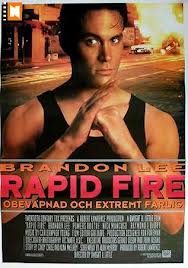
RAPID FIRE
US, 1992, 95 minutes, Colour.
Brandon Lee, Powers Boothe, Nick Mancuso, Raymond J.Barry.
Directed by Dwight H.Little.
Rapid Fire is a typical martial arts, police action feature. It was designed as a star vehicle for Brandon Lee, son of Bruce Lee. Lee also appeared, more sympathetically, in Mark L. Lester's Showdown in Little Tokyo. Here Lee is supported by veterans Powers Booth as the hardened policeman, Nick Mancuso as the head of the Mafia in Chicago, Raymond J. Barry as a corrupt FBI agent.
The film opens well with Thai locations, indicating the drug connections between Thailand and the US. However, the rest of the action is in Los Angeles and in Chicago - especially in Chicago using many locations for the shoot-outs and fights. Nothing particularly new, efficiently and effectively done by director Dwight Little, whose credits include KGB - The Secret War, Halloween 4 and Marked for Death. Part of the treatment is tongue-in-cheek - some highly emotive dialogue, some sentimentality - and a plot and characterisation which tend to go by the numbers.
1. Typical action martial arts feature? Impressive of its kind or not? The popularity of this kind of film in the '80s and '90s?
2. The opening in Thailand, locations, customs? The martial arts? The visit of Serrano, his clash with Tau? The rivalry, the violence? The setting up of the struggle? Each leader with his men and bodyguards?
3. The title of the film - and the indication of violence, shooting as well as fights?
4. Jake Low and his memories of the massacre at Tiananmen Square? The flashbacks? His father and his death? Jake's inability to help? People wanting him to speak out? His work as an artist, attracted to the model, seeing the dragon behind her? Her invitation to the gathering - and his being sought as a presence for the human rights campaign. The sudden outburst of violence and his witnessing the killing?
5. The Thai gang, Tau and his beginnings in Brooklyn? His empire in Thailand? Serrano and his dominance, putting Tau in business? Asking for debts? The visit to Thailand, his return to America? His anger at Tau's henchman? Shooting him?
6. Jake and his involvement? His defending himself, fighting the Mafia men at the gallery? His being taken by the police, examined? The police wanting to use him as a witness? His going to Chicago? His being under police protection, agent Stuart and the apartment? The crooked guards and the attempt to kill him? His escape? The encounter with Mace Ryan and with Karla? His antagonism towards them? Their offering protection when the Mafia turned against him? When Stuart set him up? His being kept under guard? The confrontation with Stuart? The planned meeting with Serrano in the restaurant? Stuart going in with him? The radio being crushed? Ryan not getting the message? The fight and the shoot-out? Jake and his ability to escape danger? Serrano's death in prison? Tau continuing with his work? The discovery of the Chinese laundry? Jake and his disguise, going in? Discovering where the heroin was kept? The confrontation - and the chase of Tau, over the roofs, on the railway line, the final fight, Tau being electrocuted? Jake and his relationship with Karla? His relationship with Ryan, cynical attitudes towards him, overhearing him talk with Karla about his appreciation and love for Jake? Jake rescuing him from the fire? Karla offering him the file about his father, coming face to face with the truth about his father, doing what was considered right? Reconciliation?
7. Serrano, tough, Chicago Mafia? In Thailand, throwing his weight around? His angers and madness? Shooting in front of witnesses? Wanting Jake dead? Having Stuart in his pocket? The meetings at the restaurant, the set-up, the confrontation with Stuart, killing him? Jake fighting him? His being taken to prison, looked after by the police? His being murdered by Tau's henchman in jail? His bodyguards and men?
8. Tau, the empire in Thailand, transporting the drugs across America? In Chicago, the death of his henchman? Confrontation with Serrano, ordering his murder? The Chinese laundry and its cover, the shooting of Ryan? The flight from Jake, the fight, his death on the railway line? The picturing of Thai drug rings?
9. Karla, the tough policewoman, the confrontation with Jake? Helping Ryan? The tough stances between them? Her attraction to Jake, the affair? Ryan expressing himself freely about Jake? Her participation in the final raid - a future with Jake?
10. Ryan, the tough policeman, ten years pursuing Tau? The chance for a witness? Bugging Stuart's phone? Being able to use the tape? Rescuing Jake from the set-up? His sardonic attitudes, the tenpin bowl and his missing, finally shooting? The plan, its going amiss? The laundry and his being shot? Saved by Jake?
11. Stuart, the corrupt FBI man, setting up the assassination, his men and the shooting of police? His family and wealthy home? Meeting Jake at the phone box? Ryan's intervention? The using of the tape to have a hold over him? Going into the restaurant, the radio connection being crushed, his death?
12. The background of Chicago drugs, police investigation, the FBI? The gang wars? Credible, all the material for an action feature?
Published in Movie Reviews
Published in
Movie Reviews
Tagged under
Saturday, 18 September 2021 19:25
Rampage/ 1963
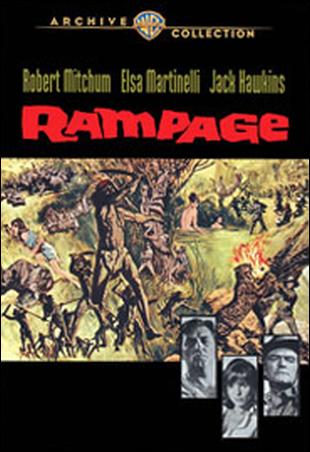
RAMPAGE
US, 1963, 98 minutes, Colour.
Robert Mitchum, Jack Hawkins, Elsa Martinelli, Sabu.
Directed by Phil Karlson.
Rampage is a colourful, if routine, action adventure of the early '60s. It was directed by Phil Karlson, best known for action thrillers. It is a start vehicle for Robert Mitchum. Jack Hawkins tends to overact in comparison with Mitchum's laconic and laid-back style. Elsa Martinelli is the ambiguous heroine.
The main aspect of the film is the Malaysian locations for hunting tigers. The scenic background is quite spectacular, as are some of the scenes with the animals. However, the rampage of the title takes place briefly at the end of the film, in a rather farfetched way, as the tiger is loose throughout the European city. There is a rousing score by Elmer Bernstein.
1. Entertaining action adventure? Colourful film about hunting?
2. European locations, Malaysian locations? Scenic beauty? Action sequences? Rousing score?
3. The title, animals? The final rampage in the City of the Tiger?
4. Harry Stanton, Robert Mitchum's laconic style? The American trapper? The meeting with Otto, with Anna? His reaction to Otto's dominance, to Anna's seductive style? His being warned off? On safari, on the plane, arranging the helicopter? Taking charge? The discussions with Otto about his trophies, the thrill of hunting, the experience of the kill? Stanton and his stances against killing? Meeting the Malaysians, making the contract, the presentation of the sabre? The promise not to kill animals? Otto and his shooting and breaking the contract? The reaction of the Malaysians? The trapping and hunting of the tigers, in nets for the zoos? The expedition for the Enchantress, finding the cave, sealing the exit, Otto going in with the torch and being mauled? Harry and his confrontation with the Enchantress, the animal's shrewdness, Harry with the light, capturing her? His being invited back? The return, the clash on the train with Otto? The relationship with Anna, talking things over, her leaving Otto? A future? The train carriage, Otto turning the tiger loose? The speeches at the station, the tiger loose in the town, hunting it, on the roof? Otto shooting and the confrontation? His death? The death of the animal? The offer to find another Enchantress? With Anna? His future?
5. Otto, Jack Hawkins' style? Arrogant, the champion hunter, his trophies? The story about meeting Anna in Italy when she was young, her being with him? Always coming back to him? His seeing her as a trophy? His getting older, going on the expedition, warning Stanton off? The agreement about the shooting and his breaking it? His failure with the rhinoceros, his having to shoot it twice? His sense of humiliation? Wanting to redeem himself and going into the cave with the Enchantress, being mauled? His humiliation, wanting to die in the hunt? Anna leaving him? In the train, the sardonic confrontation, letting the Enchantress loose? In the city, on the roof, shooting at Stanton, his being killed?
6. Anna, her Italian background, orphaned, found by Otto, brought up by him, devoted to him? Tantalising Harry? Staying with Otto, on the expedition? The Malaysians wondering about whose woman she was? Her own wondering? The parallel with the savage Enchantress and Otto and Harry? Mauling Otto, being captured by Harry? With him on the roof? Her future?
7. The zoos of the world, the need for animals, sending expeditions? Prize animals like the Enchantress? The return to Europe? The rampage, the tiger killing the worker? In the building, the role of the police? On the roof? The death of the Enchantress? The zoo hoping for another?
8. The picture of the Malaysians, their independence, their rituals? People of their word? Harry and the truce with the chief? The presentation of the weapon? The assistant, on the expedition? His offering his wife to Harry? His love for his wife? Malaysian women? The invitation back?
9. Themes of big-game hunters? The difference between killing and capturing and trapping? The macho image of the hunter? Its critique?
Published in Movie Reviews
Published in
Movie Reviews
Tagged under
Saturday, 18 September 2021 19:25
Rampage/ 1992
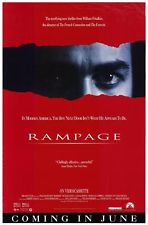
RAMPAGE
US, 1992, 97 minutes, Colour.
Michael Biehn, Alex Mc Arthur, Nicholas Campbell.
Directed by William Friedkin.
Rampage is a film studying an insane serial killer. It is very grim in its opening - but then steadies down to a courtroom drama and the background to a trial.
The film focuses on a young man, disturbed, whose cellar is full of Nazi symbols, sex symbols, human organs, since the man believes that he has been poisoned and needs to get new organs and drink human blood. He commits bizarre murders to get human organs - imagining himself as an animal. These opening sequences may be repellent to many audiences. However, as the film goes on, it settles down into the more routine study of the prosecution, the urging of the death penalty, the arguments for insanity, psychological insanity and legal insanity. Audiences will move in their response to the various arguments made.
Michael Biehn is the ambitious prosecutor. Alex Mc Arthur is very persuasive as the killer who, in general, appears as calm and serene.
The film was written and directed by William Friedkin - who had his outstanding years with The Boys in the Band, Oscar for The French Connection, The Exorcist. However, after The Exorcist he seems never to have reached such peaks of film-making. Later films include The Brinks Job, The Wages of Fear, To Live and Die in L.A., The Guardian.
1. The impact of the film? Portrait of crimes and a criminal? The justice system? The audience taking sides?
2. The California town, homes, ordinary streets? Authentic atmosphere for this crime? The prisons, the courts? Musical score?
3. The title and the reference to Charles Reece's behaviour?
4. The portrait of Tony as the successful district attorney and prosecutor? The intercutting of the initial killings with the Christmas Mass, Tony and Kate as devout Catholics? His work, his relationship with his wife, the sad memories of the death of his daughter and his being late at the hospital? The growing estrangement with Kate? His love for her, her own work, asking for time, her going to stay with her father, her return and asking for final separation? His dedication to his job? His being persuaded to go against his principles and Kate's to argue for the death penalty. His persuading himself that Reece was sane? The gruesome visits to the crime scenes? His investigations? Interrogations of Reece? Of the psychologist? The build-up to the court sequence, his brief? Studying at home? The interrogations of the doctors, the psychologist changing his testimony, his trying to pin down arguments for legal sanity? The discussions with the judge, the combating of the defence lawyer? The behaviour of Reece - especially his escape and killing the guards? The appeal to the father to testify - and sharing the experience of the death of his daughter? His skill in the courts, winning the case? The appeal? The scientific and technological background, the brain scans, the final brain scan and the decision of the judge? The indication of mental illness? His taping the message to Kate, apologising, going back on his strong attitudes, questioning what he had done? His future?
5. Kate, her love for her husband, the bond with their daughter, her illness and death? Her strength? Support of her husband, principles, her own career, the possible conference, wanting time with her husband? Going away, the return, suggesting the separation? Would they reconcile?
6. The visualising of the crimes: Charles Reece, his entering the home, shooting people, the carving knife, his taking the organs? Going in the kitchen door of the house, killing the mother, abducting the child? His being approached at the service station, his lies, running away? Legally insane? Mental illness? Paranoid schizophrenia? The interrogations, his distance from his behaviour, yet giving the right answers? Discussions with the psychiatrists? With his defence lawyer? His behaviour in court? His mother's explanation of the background, her going out from the family, the father beating her, his staying with his father, his father's death? The cellar and its gruesome contents? His own imaginings of himself as an animal? Behaviour in the court, in the van, asking for the doughnut, slashing the guards and escaping? Being caught again? Audiences' decision about his mental health? The brain scans? The conflicting testimony of the psychiatric experts? Dr Death? The plea for his life? The condemnation, the speech made about the meaning of his life only in killing people and a chance to reform? His taking his own life -or his mother killing him? Audience sympathy for the mass killer?
7. The attitude of the prosecutor, insanity, the interrogations, discussing with the psychiatrist? The stances against the death penalty? The summation speeches - the appeal of the defence lawyer for sparing a life, the appeal of Tony as prosecutor and the rights of the victims? The device of pausing for three minutes to experience the time in which a victim died? The jury and their discussions? The stances that they took - and their verdict?
8. The portrait of the victims, the glimpse of the family killed, the father and the mother, their two boys? The more personal touch with these killings? The return of the father, the boy discovering the bodies? The father's unwillingness to testify? Taking his boy away, their travelling, at the carnival - at the film's finale?
9. The picture of the psychiatrists, one influencing the other, reputations, culpability? Altering documents? Stances? Dr Death - and his strong opinions about mental health?
10. The judge, his fairness, his own experience of a brutal murder case? His fairness during the proceedings, getting the final report?
11. The district attorney, ambitions, going for the death penalty? Working within the system? Going to the scenes of the crime, the discovery of the young boy's body? The police? The two guards in the van - and their carelessness and their deaths?
12. The tradition of films dramatising such crimes? How sensationalist? How much insight into the criminal mentality? Audiences needing to experience the reality of these crimes? As background for understanding justice, jury work, penalties, especially the death penalty?
Published in Movie Reviews
Published in
Movie Reviews
Tagged under
Saturday, 18 September 2021 19:25
Rambo III
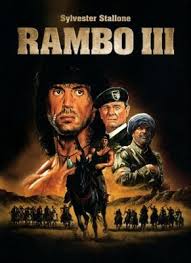
RAMBO III
US, 1988, 101 minutes, Colour.
Sylvester Stallone, Richard Crenna.
Directed by Peter Macdonald.
Rambo III was a box-office success of 1988. Sylvester Stallone had established the character of John Rambo, ex Green Beret fighter and American society victim, in Ted Kotcheff's First Blood. Stallone wrote a screenplay for Rambo II and focused on the question of veterans missing in action in Vietnam. George Pan Cosmatos directed this actioner. There were many disputes about Rambo III and finally second director Peter McDonald? directed the film, co-written by Stallone himself. It is slam-bang jingoistic action, full of explosions - set in Afghanistan, which made the film already somewhat out of date with the negotiations and the Russian withdrawal in '88-'89. It is very much the macho pro-American film. Richard Crenna re-creates his portrayal of Trautmann.
1. Popular action film? The popularity of Sylvester Stallone? His Rambo character? The Green Beret veteran? Action in Afghanistan? The parallels at the end with the western - and the Afghan cavalry to the rescue?
2. Production values: Thailand settings, Afghanistan? Mountain locations? Stunts, special effects? Musical score?
3. The focus on Rambo as a character, his reputation in the '80s? A byword for macho action? Military style?
4. The opening: Rambo in Thailand, at work on the buildings, his fights, the fight sequence? Trautmann and the American official watching? Their approach to Rambo? Invitation to Afghanistan? His refusal?
5. Trautmann and his work, going to Afghanistan? His being captured and imprisoned? The news coming to Rambo? His decision to go to Afghanistan?
6. Rambo's arrival in Afghanistan, contacts, his guide, the young boy? Getting the equipment? The status of the Russians, their presence? Their armed equipment? The Afghan rebels, the tribes? His meetings with them, proposals? The use of a few men for his mission?
7. The mission, his men, the boy? The dangers, riding, the infiltration into the Russian headquarters? The armaments? The underground? Attempting to find Trautmann? The conflicts, the deaths, the battles? The dangers? Rambo's shrewdness, his Green Beret skills? Getting Trautmann, getting out? The pursuit? In the underground tunnels? The air attack, bombardments? In the mountains? The final fights? The confrontation with the Russians, the leader? The Afghan cavalry coming and the final rescue?
8. The character of Rambo, a stereotype role? How much personal characteristics? Trautmann as a character, his position in the U.S., friendship with Rambo? Imprisonment, torture? The rescue, his helping Rambo?
9. The Afghan characters, stereotypes, participation in the mission? The boy?
10. The popularity of this kind of action film during the Reagan years?
Published in Movie Reviews
Published in
Movie Reviews
Tagged under
Saturday, 18 September 2021 19:25
Rambling Rose
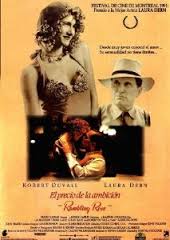
RAMBLING ROSE
US, 1991, 121 minutes, Colour.
Laura Dern, Robert Duvall, Dianne Ladd, Lukas Haas, John Heard.
Directed by Martha Coolidge.
A totally engaging performance by Laura Dern and the fine contributions of Robert Duvall, Dianne Ladd (Dern's mother) and Lukas Haas make this a memorable visit to the American south of the '30s. The town is quite proper, but Haas is a young adolescent and into his and his family's life comes the innocent yet sexually put-upon, poor sharecropper's daughter, Rose. Nothing is the same again.
The treatment is gentle, although there is a forceful sequence where Mother takes a defiant stand against Daddy and the doctor about surgical treatment of Rose. Direction is by Martha Coolidge. She brings an unsentimental but sympathetic sensibility to her portrait of a memorable young woman.
1. A portrait of a family? Of a young woman? Of Americans in the south in a particular period and in a particular context? The film as a piece of Americana?
2. The Georgia settings, the contrast between the '70s and the '30s? The family home, its grounds, the town? The musical score, the jaunty tone, the romantic tone? The use of `Dixie' for Rose's walk and for the final credits?
3. The title and its focus, on Rose, the image of the flower and its meaning for her character? People's perceptions of Rose and their judgments on her?
4. Buddy and his telling the story about Rose and his family? His perspective and memory of Rose and interpretation of her? His journey in the '70s, arriving at the house? His reminiscences? The ending of the film and the return to the '70s, Buddy talking with his father, the news of Rose's death, their memories and assessment of her? Buddy and his being in love with Rose? Father and his love for her? The flashbacks and Buddy as a young teenager on the veranda, seeing Rose with her hat and her dress, her bag, her walking style? Buddy's age, his relationship with his brother and sister, with his parents? The detail of life at home, meals, study, play? His fascination with Rose and watching her? Sexual awakenings? Their watching their father and Rose's seductive manner with him? Rose and her coming to Buddy's bed? The repercussions on him, his infatuation with her? Following her, watching? His talk with her and her wisdom? His concern for her? Her illness? What he learnt from Rose? The impact of her death and his assessment of Rose?
5. The portrait of Rose and Laura Dern's performance, Oscar nomination? Her appearance, arrival, tall and lanky, rambling walk, her appearance? The background of her story and poverty and yet her surviving? Her innocence? Her sexual experiences, prostitution and surviving? The welcome into the home, the interview by Mother, the consent of Daddy? Buddy and the other children and their response to Rose? The introduction, her work, her relating to all the family? Her naivety and niceness? Yet her infatuation with Daddy, the attempted seduction? Her naivety and ignorance? Learning how to be in the household, manners? Her relationship with Buddy, his sexual awakening? Discussions, work, talking to Mother - her history? Going to town, her dress, her walk down the street? The men fighting over her? Her involvement? Jail? Daddy and his reprimands? The young man in her room and his trying to jump out and escape? Rose's illness, the discussions with the doctor, sterilisation and eugenic theories of the period? The doctor's explanations, Mother's reaction? Her operations, her recovery? Her finally leaving? Finding Mr Right, her happiness, the wedding ceremony - but with the edge of criticism by her husband? The postscript and the story of her marriages, her finally settling down? Her death?
6. Robert Duvall as Daddy, the southern gentleman? Welcoming Rose into his home, hard and disciplined, yet bending? The manners of the house, his relationship with his wife? The tensions and Rose's attempted seduction? His severity? His relationship with his children? His place in the town, his observing Rose, his reaction to her relationships with the men, the young man in her room? The illness, the discussions with the doctor and his seeming to go along with the theories, his change of heart? His support of Rose - but wanting to get rid of her, glad of her marriage? Buddy's visit in the '70s and their reminiscing, his love for Rose, his memories, her effect on his life?
7. The character of Mother, Diane Ladd and her Oscar nomination? A southern lady, her taking in those who were poorly off? The orphan? Her relationship with her children, teaching them, their manners, style in the house? Her deafness? Her relationship with her husband, love? A studious and educated woman? Welcoming Rose, supervising her? The tensions in her relationship with her husband? Helping Rose to settle in, to work, her clothes? The interview with the doctor about Rose's illness and the question of sterilisation? Her indignation and her attack on the doctor? Her letting Rose go - and her joy in her wedding?
8. The children, their relating to Rose, learning from her, playing with her, discussions?
9. The picture of the town, Rose's walk down the main street and the playing of `Dixie'? The reactions of the men, her ability to turn men's heads, their fighting, jail?
10. The character of the doctor, the science of the times, the eugenics theory? Rose's illness, hospitalisation, his assessment, the recommendations to Mother and Daddy? His being in good faith - and Mother's reaction? Health issues? Women's issues and women being victims of patriarchal medical decisions?
11. A portrait of people, foibles of human nature, strengths of human nature? Relationships between men and women? Children and their growing up, experiences and role models? A film of its time - but with the perspective of a '70s assessment of the '30s?
Published in Movie Reviews
Published in
Movie Reviews
Tagged under
Saturday, 18 September 2021 19:25
Rainbow Drive
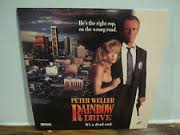
RAINBOW DRIVE
US, 1990, 100 minutes, Colour.
Peter Weller, Sela Ward, David Caruso.
Directed by Bobby Roth.
Rainbow Drive is an entertaining police thriller with a Los Angeles setting. In the tradition of the film noir, it presents the city of Los Angeles, the police and the media as corrupt. The plot is complex, focusing on Peter Weller as an acting police chief, investigating a crime and finding himself thwarted. Sela Ward is a psychologist who is also an FBI agent. The film shows the work of the LA police, nightclubs designed for laundering money for corrupt wealthy press barons, international criminals, the world of drugs. The film is full of action but concentrates on the character of the central policeman, his relationship with his partners and with the psychologist. There is more depth than might be expected in this kind of drama.
1. The world of the police, Los Angeles, corruption? The traditions of the film noir? The '80s and '90s portraits of the big American cities and social corruption?
2. The Los Angeles settings, Hollywood, wealthy mansions, the drug world, clubs, the media, police precincts? The musical score? The range of songs performed at the club?
3. The title, the Los Angeles focus, the street and the neighbourhood?
4. Peter Weller's portrait of Mike Gallagher: type, his relationship with women, the affair with Christine? His ability with his work, deputy head? The finding of the dead bodies, the chase? Getting the information about the car? A man of professional integrity? His relationship with Dan, their discussions, investigation? With Marvin? The clashes with Hammond and his being banned from the murder site? The missing body? The press conference of Cutler and his relationship with the media owner? The campaign for mayor? The clashes with Hammond? His being warned? The club, Maxwell, Rory? Discussions with Ira at the morgue and the mystery about Val's body and its being moved? Dan and the flashback to the case concerning Val, the $25,000? The meeting with Laura, the discussions? The exchange of information? The impact of Dan's death, his grief, going to see Dan's wife? The funeral? His discussing with Laura and her allowing him to weep? The confrontations with Hammond and other authorities? His room being bugged? His getting help from Marvin, their discussions? His going to the club, getting the information about Maxwell, taking him to the shower and getting the information? The video and the truth? The confrontation with the paper owner? The chase, the shoot-outs, Hammond's death? The arrival of the FBI?
5. The murder mysteries, the deaths, the background of the drugs, Val's death? The cover-up, Hammond moving the body, in charge of the investigation? Cutler and his ambitions to be mayor? The money-laundering? The press owner and his arranging his own daughter's death?
6. Laura, personality, work? Giving of information? Support for Gallagher? The information about the FBI?
7. Dan, his background, his story, the money, his death? The grief of his wife? Marvin, his background, his electronic skills? Saving Gallagher?
8. The club, the clientele? Rory, the laundering of the money, the murders and the violence, the confrontation - and the photo of the dead Christine?
9. The police, Hammond, Cutler, corruption and honesty? The influence of the media baron? His explanation of money turnover? His comments about his daughter - as a drug addict and his abandoning her?
10. The themes of the American cities, police, crime, drugs, power? A portrait of an American city in the '90s?
Published in Movie Reviews
Published in
Movie Reviews
Tagged under